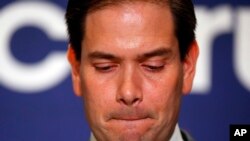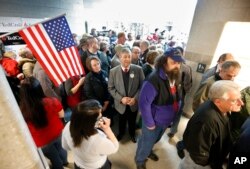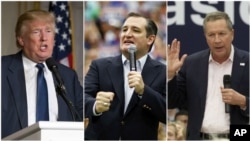Florida Senator Marco Rubio suspended his campaign for the U.S. Republican presidential nomination when he lost badly two weeks ago in his home state to the party's front-runner, businessman Donald Trump, but now Rubio is trying to defeat him by hanging on to the delegates to the party's national nominating convention that he won in other states.
Before dropping out of the race, Rubio won 171 delegates to the July convention, where Republicans will pick their nominee to run in the national presidential election in November against the Democratic candidate.
Trump has won about 60 percent of the 1,237 delegates he needs to claim the nomination, but it is unclear whether he can win enough delegates in the remaining state-by-state party primaries and caucuses to claim a majority before the quadrennial gathering starts.
Second ballot
On the first convention nominating ballot, delegates are mostly bound to vote for the candidates according to the outcome of the voting in the state contests. But almost all are released to vote as they choose on second or subsequent ballots if no candidate is able to secure a majority on the first round of voting.
If the nomination battle between the brash Trump, a political novice, and his two remaining challengers, Texas Senator Ted Cruz and Ohio Governor John Kasich, is not settled after the first ballot, Rubio's cache of delegates could play a crucial role in a second round of voting. He has informed party officials in the 21 states where he won delegates that he does not intend to release his delegates to vote as they wish on the first ballot.
There has not been a contested Republican national convention since 1976, but there is a significant chance there will be this year. Trump needs to win nearly 60 percent of the remaining delegates at stake in the 18 state nominating contests that are scheduled through early June to claim the nomination. Something short of that winning margin would likely leave him with a substantial plurality of convention delegates, but not a majority.
All of the original 17 candidates in the Republican presidential nomination race had pledged to support the eventual nominee, but as the race has evolved into a contest of sharp taunts, the three remaining contenders have now backed off their pledges to support the winning nominee.
Democratic race
In the Democratic race, former U.S. Secretary of State Hillary Clinton has built a commanding lead for the party's presidential nomination, but has yet to secure a majority of delegates to her party's national convention, also set for July.
Clinton has lost several recent state nominating contests to her lone rival, Vermont Senator Bernie Sanders, and the two are locked in a tight contest in the next primary, Tuesday's race in the northern state of Wisconsin.
The three Republican contenders also are facing a primary election the same day in Wisconsin.







